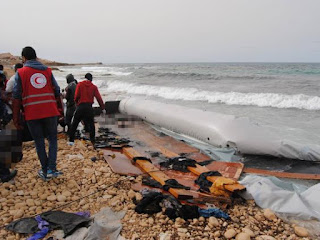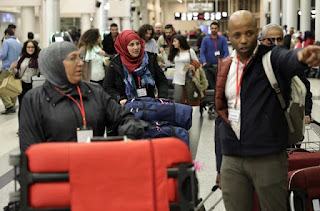Almost 30 migrants have been found dead in a boat drifting off the coast of Libya as the number of refugees dying in attempts to reach Europe reach record highs.
Fishermen found the bodies of 28 people, including four children, in waters near the smuggling hub of Sabratha after more than 8,300 asylum seekers were rescued over the Easter weekend.
“Their boat stopped in the middle of the water because the engine was broken,” said Ahmaida Khalifa Amsalam, the interior ministry’s security commander.
He said the victims appeared to have died of thirst and hunger after their vessel was left drifting in the Mediterranean.
They were buried in a cemetery dedicated to migrants whose bodies are regularly washed up on the coast of Libya, which remains embroiled in a bloody civil war six years after the UK helped overthrow Muammar Gaddafi.


Smugglers have increasingly resorted to packing migrants into flimsy dinghies that are unable to survive the crossing to Europe, with some being intercepted and forced back by the Libyan coastguard, others being rescued by EU officials and aid agencies, and many sinking.
Tuesday’s tragic discovery was the latest incident of refugees being found dead inside boats, with a worrying trend emerging suggesting engines are being removed or sabotaged at sea.
The bodies of more than 70 migrants washed up in a dinghy in Zawiyah earlier this year in what aid agencies said suggested the “deliberate punishment or murder of migrants”.
Joel Millman, from the International Organisation for Migration (IOM), said that boat’s engine was believed to have been removed at sea, possibly by smugglers or armed gangs.
“In most cases you don’t find remains in a boat – you find them washed up or floating, although there have been cases of suffocation on board,” he told The Independent.
“We have heard about arguments occurring with smugglers, where people refuse to get in a boat because they are concerned it isn’t seaworthy.
“Then there’s violence and people are killed, while the rest are forced inside.”
The latest disaster came as the Austrian government called for the Central Mediterranean passage to be shut down, like the crossing from Turkey to Greece and Balkans route.
“A rescue in the open sea cannot be a ticket to Europe, because it hands organised traffickers every argument to persuade people to flee for economic reasons,” interior minister Wolfgang Sobotka told Germany’s DPA news agency
“[Stopping crossings to Europe] is the only way to end the tragic and senseless deaths in the Mediterranean.”
His comments followed months of growing political attacks on NGOs, who say they have no involvement in trafficking and are only conducting search and rescue missions because of the EU’s failure to tackle the refugee crisis.
More than 5,000 refugees were drowned, suffocated or died of hypothermia at sea in 2016 – the vast majority on the Central Mediterranean route from Libya, which is now the deadliest crossing in the world.
That total is expected to be surpassed this year, with the official UN death toll already nearing 1,000 even before the start of the peak season.
The controversial EU-Turkey deal slowed comparatively shorter and safer boat crossings over the Aegean Sea to a trickle last year, but the number of migrants on the treacherous passage from Libya to Italy has continued to increase.
More than 40,000 asylum seekers have been taken to shore by rescue ships in Italy so far this year, while others arrive in Spain, Greek islands, and Cyprus.
The arrivals are putting huge pressure on the Italian government, which is already housing about 176,000 migrants in reception facilities, while thousands more remain trapped in Greece, Serbia and across Europe.
European leaders met in Malta earlier this year to discuss efforts to stem the crisis but resolutions to increase funding and support for Libyan authorities were criticised amid allegations of widespread human rights abuses.

The country remains divided between battling militias accused of kidnapping, torturing, detaining and ransoming migrants or forcing them into labour and prostitution as a source of income.
Nato has received a request from the fragile Libyan Government of National Accord for support, while Italy has pledged millions of euros in funding for anti-smuggling initiatives.

It is preparing to deliver patrol boats to the country’s coastguard, which is itself accused of killing and beating migrants, for increased push-back operations.
Flavio di Giacomo, an IOM spokesman in Italy, said the vessels’ imminent arrival could be driving a dramatic increase in attempted crossings that saw more than 8,300 people rescued from 55 boats over the Easter weekend.
The rescues saw 13 bodies recovered, including that of an eight-year-old boy.
Mr Di Giacomo said smugglers were using the threat of fresh patrols to coerce their customers into crossing.
“They are telling them the Libyan coastguard is going to be in charge of all rescue operations and send them back to Libya, which is the last thing they want to do,” he told The Independent.
“It is just one of the methods used to get more money and hurry them up – they use all the information they can get from Europe to improve their business.”
Mr Di Giacomo said smugglers were known to force refugees into boats at gunpoint and beat any with concerns over the flimsy vessels, adding: “The conditions for migrants in Libya are worsening.
“A lot of them never wanted to go to Europe, they wanted to work in Libya and then they got stuck and abused.
“They see crossing the Mediterranean as the only way out

No comments:
Post a Comment